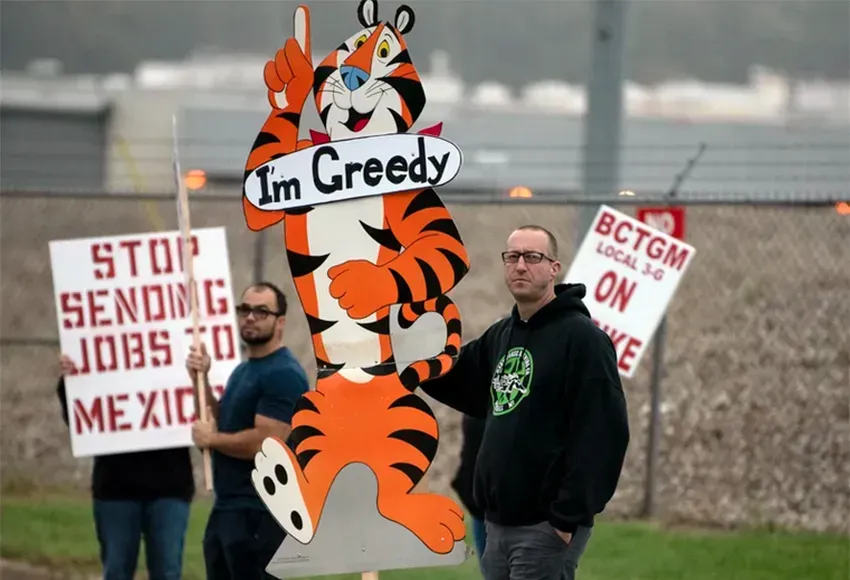For the last 11 weeks, over 1,400 workers employed by the food giant Kellogg's have been on strike. Tuesday marked the end of the workers' fight, though, when they voted through their union to accept a new collective bargaining agreement with the company.
Workers' demands and the new agreement
Workers from all of Kellogg's US production plants began to strike on October 5, citing poor workplace conditions and the corporation's unequal, two-tier pay structure, which was cutting wages and making promotion more difficult for new employees, meaning also that transitional employees were paid significantly less than their "legacy" counterparts for the same work.
Meanwhile, long-time employees said they were extremely overworked, especially during the pandemic. Prior to the strike, the company's US plants, located in Omaha; Memphis; Battle Creek, Mich.; and Lancaster, Pa., were running beyond 100% production capacity, "24/7," according to CEO Steve Cahillane.
"[Kellogg's] is breaking production records every single day," he said in an early-pandemic interview with CNBC. Stay-at-home life provided the cereal company a boost in profits, with 2020 bringing in $1.76 billion in commercial sales. Though the financials were impressive at the time, the strike brought to light an unfortunate reality for workers at workers.
"They want you to use your vacation days as opposed to having sick days," said Todd Manusos, who has worked in production labor at Kellogg's for 24 years. "And [work in] excess of 120 days in a row." Manusos is one of several workers who testified during the strike that they worked through weekends and holidays the past two years and sometimes prior.
Kellogg's hiring of permanent replacements for the 1,400 employees on strike was suspended as Tuesday's agreement was being settled. Kellogg's received criticism from President Biden for the threat. But now, employees who were on strike will return to work alongside the replacements who were hired.
The agreeement
This second attempt to come to a deal offers improvements in both conditions and contracts for newer employees. Addressing the two-tier system, it describes the potential for "transitional" employees to receive the same pay as legacy employees after four years of employment (though not with equal benefits). Cost-of-living increases will begin immediately for all employees, and transitional employees will now get paid $24.11 an hour, up from $19.92.
Tuesday's vote by the workers' union, the Bakery, Confectionery, Tobacco Workers and Grain Millers' International Union (BCTGM), came just as workers were speaking of large-scale changes beyond Kellogg's.
Anthony Shelton, the BCTGM's president, issued a statement Tuesday: "Our striking members at Kellogg's ready-to-eat cereal production facilities courageously stood their ground and sacrificed so much in order to achieve a fair contract," he said. "This agreement makes gains and does not include any concessions."
The union and strikers rallied outside of Kellogg's headquarters in Battle Creek just last Friday. Those on the picket line spoke of all the time they have spent fighting for these changes and generally the end of corporate greed.
"We didn't set out to fix things in a short-term fashion; we set out to fix things in a long-term fashion," said Trevor Bidelman, a fourth-generation Kellogg's worker and the BCTGM Local 3-G president in Battle Creek. "They're exploiting us. That's what we're here to do: to stop the exploitation of the middle-class worker," he said. "We will not stop fighting, we will not give in, until that is attained."
Online and national impact
In holding the picket line these past few cold months, the strikers also received national attention and an outpouring of internet support. Sen. Bernie Sanders (D-Vt.) made an appearance to encourage the crowd to continue, and hosted the event's livestream for the rest of the nation to watch.
Throughout the country, some stores' breakfast shelves were labeled "empty due to Kellogg's Worker Strike." Also, many have begun to advocate for boycotts of Kellogg's products. The company owns dozens of household names, from the classic cereals Corn Flakes and Raisin Bran to meat-alternative brand Morning Star and Carr's crackers. TikTok videos portray the breadth of brands for all to behold and boycott, saying, "Don't cross the picket line! Avoid these products."
Kellogg's did not respond to this internet "cancelation," but just days before the end of the strike, it tweeted its decision to remove Kellogg's marcations from its popular breakfast toaster pastries Pop-Tarts. Twitter users responded that this move proves the effectiveness of boycott.
One TikTok creator, Sean Wiggs, decided to get involved after reading about the strike online, and found a community of like-minded individuals across the country on the Reddit board r/Antiwork. Putting his passion for coding to work (he is self-taught), he developed a bot full of random data that allowed users to spam Kellogg's job postings while the company was attempting to hire scabs [https://bit.ly/3yS2tm7]. Kellogg's was unable to keep up with the resulting applications.
Acts of support such as this demonstrate the country's realization that we are almost all working people. Workers' rights violations will no longer be tolerated, and even Gen Z is finding creative ways to say so.


